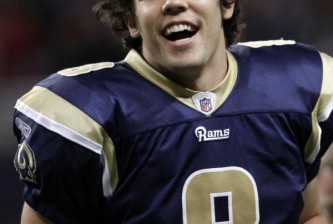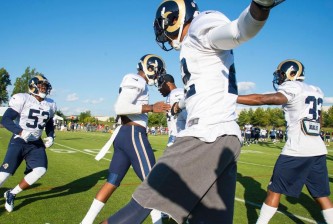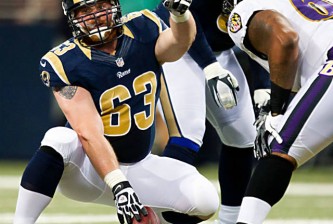
Roger Goodell and DeMaurice Smith together in a rare show of positive spirits. Photo by Brian Blanco, AP.
On a Monday, a blazing hot summer sky ripped open with explosions, the symbolic fires of war lighting up peaceful landscapes filled with the aromas of hot dogs and warm beer. Such began a week of paradox in the world of football.
The business week began on Tuesday with unprecedented optimism in the ongoing lockout talks. The true leaders of each camp had taken over talks from the lawyers, who speak only in fire and brimstone, and the framework of a deal seemed to be in place.
The formula suggested last month by the players, which ties their take to the concept of “all revenue,” instead of “adjusted revenue,” is a simple and reasonable one that should appeal to both sides. Rather than squabble over an altered business model, cost credits or whether owners should open their books, the all-revenue approach frees up the respective parties to craft a cut-and-dried, mutually beneficial business partnership.
As Mike Silver suggested, all the owners and players had to do at this point was forget about the squabbling of the last four months, and “hug it out.”
However, the concept of “all revenue” is a decidedly tricky one for Goodell and his 32 bosses, especially those like Jerry Jones and Daniel Snyder who specialize in creating new revenue streams that sit outside the revenue sharing model — and sit outside the purview of their fellow owners.
As the financial stakes grow higher, even simple solutions are far from simple to execute.
Wednesday brought news of the passing of John Mackey, the first NFL Players’ Union president of the modern NFL. Mackey’s mid-life struggle with dementia after a long NFL career inspired the “88 Plan,” one of the few bright spots in the league’s treatment of retired players.
Thursday brought a rude interjection from the legal world, however, as the 8th Circuit Court finally rendered their long-delayed verdict on the legality of the Lockout. But the resulting message is either a bombshell or a harmless dud, depending on how the parties react.
Paraphrasing the courts’ decision: “If you want to lock the players out, we won’t stop you; and if the players seek treble damages in the contengency of a lost season, we won’t stop that either.”
Friday, then, Friday, then, saw an evaporation of positive momentum in talks, as this news rippled through both sides of the dispute.
Says the NFL Network’s Albert Breer:
The next round of talks will be critical, with the days waning before preseason games will be forced off the schedule. The NFL estimates an entirely canceled preseason would cost nearly $1 billion in revenue, and although the players believe that number is inflated, there is little question the figure would be significant and take a serious toll on any proposal made by the league.
Breer’s reporting reminds us of one major positive throughout this whole process: the fine and unbiased work that the folks at the NFL Network are doing. Rich Eisen tells us about the network’s uncompromising journalistic ethics in an interview with Yahoo.
“This is the first time a network based on a single sport has ever gone through a labor dispute. There’s no playbook to work from. But our mantra from the beginning was, ‘Just treat this like any other story. Get the facts, get ‘em right and report ‘em.’
“I’ve not once been told by anybody, ‘Don’t say this,’ or ‘This is what you should say; it’s a talking point.’ Thank goodness. I know we’re owned by the NFL, but we have been truly left alone. We have not been a blunt-force instrument.”
If there’s one thing that Goodell has managed well — and we’ve called him out on things he’s managed poorly — it’s this. Keeping the doors open to fans in this painful process helps re-open the doors to them when it’s through.
Words that Mike Silver wrote last Tuesday remain equally true next week: as long as we get a CBA soon, both Smith and Goodell can walk away as heroes.






















